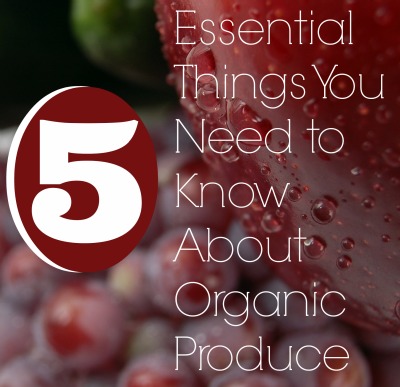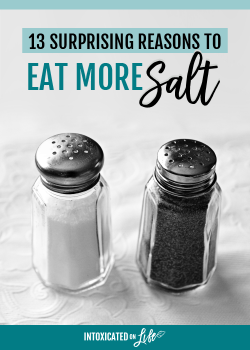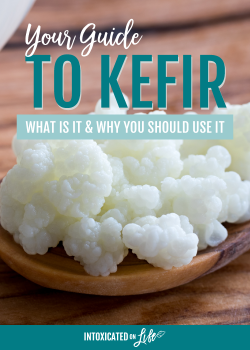
You’ve always heard you should eat your fruits and veggies, but there are some fruits and vegetables that give you more bang for your bucks. What about pesticides? Organic produce? GMO’s? We’re going to talk about all of that this month and hopefully you’ll get some good ideas of which fruits and vegetables will have the quality, vitamins, and minerals that you need!
1. Definition of Organic Produce
In order for produce to be USDA certified organic it must meet the following requirements:
- Grown without the use of pesticides.
- Grown without synthetic fertilizers.
- Grown in the absence of sewage sludge.
- Have not undergone bioengineering and must be non-GMO (genetically modified organism… more on this later).
- Must not have undergone ionizing radiation.
2. Organic Advantage #1: Nutrition
Is organic produce more nutritious? This is a hotly debated topic. There is some research that affirms that at least some varieties of organic produce have more vitamins than non-organic produce.
The infamous study from the Annals of Internal Medicine stated:
The published literature lacks strong evidence that organic foods are significantly more nutritious than conventional foods. Consumption of organic foods may reduce exposure to pesticide residues and antibiotic-resistant bacteria.1
This is the report that caused headlines across the US to tout that organic foods were a waste of money and at the same time outrage natural living folks.
On the other hand, reports from Soil Association Certification states that organic crops are higher in vitamin C, phytonutrients, and essential minerals.2 These findings have been supported by many other studies as well.3, 4, 5, 6, 7, 8
3. Organic Advantage #2: Pesticide & Neurotoxin Free
Besides (probably) being more nutrient dense, organic produce is not coated in toxins. Some of the pesticides that are used in growing conventionally raised produce are known neurotoxins. Much non-organic produce is also genetically modified. These seeds are modified to actually produce their own pesticides. These foods may actually continue to produce pesticides after ingestion.
Neurotoxins are harmful to the brain. Our children’s brains, which are still growing, are particularly susseptible to damage. For me, this is the most important reason I’ve chosen to purchase many of my foods from the organic section.
4. Organic Advantage #3: Taste
I suppose this is a pretty subjective point, but I personally think organic produce typically tastes better than conventionally raised produce.
5. You Can Buy Organic Food on a Budget
Organic produce can be pricey and difficult to fit into a grocery budget. Do you know why organic food tends to be more costly than conventionally raised produce?
Organic farmers do not receive government subsidizing like conventional farmers do. This is one of the big reasons organic foods tend to be more expensive. In addition, organic farming tends to be more labor intensive and farms do not tend to produce as much food, so they don’t benefit from bulk sales.
Here are a few tips for purchasing organic produce on a budget:
1) Visit your farmers market. Many local farmers grow “organic” food even if it isn’t USDA certified organic. Talk to the farmers and ask them about their growing practices. It’s likely you’ll get a bargain, especially this time of year, on some great produce at your farmers market.
2) Check out your local grocery stores for sales. One particular grocery store in my area often marks their organic produce down. I can frequently purchase organic romaine lettuce for cheaper than conventionally raised lettuce. I’ve often found other produce marked down as well.
3) Do the best you can! There is some produce that it is more important to purchase organic than others. Have you heard of the dirty dozen? These are the conventionally grown fruits and vegetables that have been found to have the highest pesticide residues. If you can only afford to buy some organic produce, make it this list:
Dirty Dozen
- Peaches
- Apples
- Sweet Bell Peppers
- Celery
- Nectarines
- Strawberries
- Cherries
- Pears
- Grapes (Imported)
- Spinach
- Lettuce
- Potatoes
Conversely, the following list is a list of conventionally grown produce that has lowest amount of pesticide residue. These are the least important to purchase organically.
Clean 15
- Onions
- Sweet corn
- Pineapples
- Avocado
- Cabbage
- Sweet peas
- Asparagus
- Mangoes
- Eggplant
- Kiwi
- Cantaloupe (domestic)
- Sweet potatoes
- Grapefruit
- Papayas
- Mushrooms
If you simply can’t afford to purchase any organic produce, be sure to wash and peel all of your fruits and vegetables.
Do you purchase organic produce? If so, is all of your produce organic or just some of it?






Before I go any further, I have just one word. CHEESECAKE! 🙂
I shared two super practical posts this week: how to eat less refined flour, and how to eat more whole wheat flour and like it…. but neither of those taste as good as the vanilla bean cheesecake recipe I shared. And no, having cheesecake on-hand is not one of the tips to eat less refined flour – but it certainly doesn’t hurt!! 🙂
Thanks for hosting!!
Cheesecake… my fave! 🙂
Thanks for hosting. I loved the post. We shop organic as much as we can.